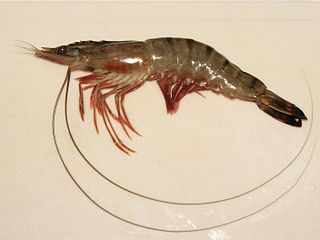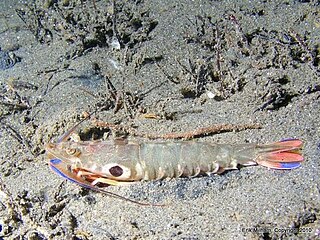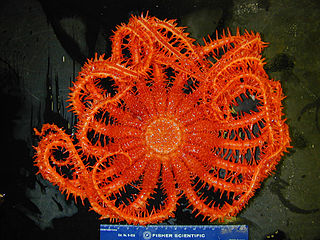
Mary Jane Rathbun was an American zoologist who specialized in crustaceans. She worked at the Smithsonian Institution from 1884 until her death. She described more than a thousand new species and subspecies and many higher taxa.

Alfred William Alcock was a British physician, naturalist, and carcinologist.

Xanthidae is a family of crabs known as gorilla crabs, mud crabs, pebble crabs or rubble crabs. Xanthid crabs are often brightly coloured and are highly poisonous, containing toxins which are not destroyed by cooking and for which no antidote is known. The toxins are similar to the tetrodotoxin and saxitoxin produced by puffer fish, and may be produced by bacteria in the genus Vibrio living in symbiosis with the crabs, mostly V. alginolyticus and V. parahaemolyticus.

Penaeidae is a family of marine crustaceans in the suborder Dendrobranchiata, which are often referred to as penaeid shrimp or penaeid prawns. The Penaeidae contain many species of economic importance, such as the tiger prawn, whiteleg shrimp, Atlantic white shrimp, and Indian prawn. Many prawns are the subject of commercial fishery, and farming, both in marine settings, and in freshwater farms. Lateral line–like sense organs on the antennae have been reported in some species of Penaeidae. At 210 metres per second (760 km/h), the myelinated giant interneurons of pelagic penaeid shrimp have the world record for impulse conduction speed in any animal.

Palaemon is a genus of caridean shrimp in the family Palaemonidae.
Fenner Albert Chace Jr. was an American carcinologist.

Heterocarpus is a genus of deep-sea shrimp, mainly of tropical areas all over the world.

Metapenaeopsis, the velvet shrimps, is a prawn genus in the family Penaeidae. It contains these species:

Sicyonia is a genus of prawns, placed in its own family, Sicyoniidae. It differs from other prawns in that the last three pairs of its pleopods are uniramous, rather than biramous as seen in all other prawns.

Trachysalambria is a genus of prawns, containing ten species. It was erected in 1934 by Martin Burkenroad, as a subgenus of Trachypenaeus, with T. curvirostris as its type species. That subgenus was elevated to the rank of genus in 1997 by Isabel Pérez Farfante and Brian Kensley. The ten species are:

The Brisingidae are a family of starfish found only in the deep sea. They inhabit both the Atlantic and Pacific Oceans at abyssal depths, and also occur in the Southern Ocean and around Antarctica at slightly shallower depths.

Metapenaeus is a genus of prawns, containing the following species:

Aristeidae is a family of Dendrobranchiata decapod crustaceans known as deep-sea shrimps, gamba prawns or gamba shrimps. Some species are subject to commercial fisheries.
Brisinga is a genus of starfish in the family Brisingidae. The species in this genus are primarily found in deep sea habitats.

Solenoceridae is a family of decapods, containing 10 genera. Members of this family are marine, inhabiting shallow and offshore waters from the mid-continental shelf, ranging from depths to 1000 meters deep. Members of this family are also sometimes confused with other commercial shrimp species.

Hymenopenaeus is a genus of prawns containing 17 species.

Acanthephyra is a genus of shrimp in the family Acanthephyridae, with species that live at depths from 0 to more than 5000 meters deep below the ocean surface.
Solenocera hextii, the deep-sea mud shrimp, is a species of decapod within the family Solenoceridae. The species is found distributed in the Gulf of Aden, Arabian Sea and in the Bay of Bengal along the coasts of Yemen, Oman, Pakistan, India and Sri Lanka at depths of 120 to 505 meters. It is usually caught by deep sea trawlers at depths of 150 to 200 meters during January to March. Males grow to 5.5 centimeters whereas females can grow up to 13.8 centimeters in length. The species spawns from November to April, with the a peak in breeding occurring in January to February.















